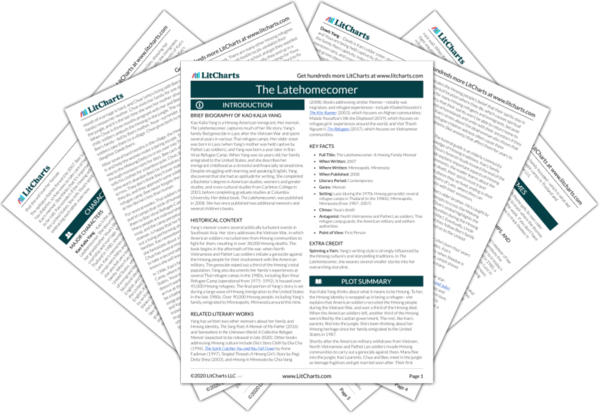Author Kao Kalia Yang ruminates on the nature of love in her memoir The Latehomecomer. She notes that fictional stories tend to depict love as intense, short-lived, romantic infatuations, whereas she sees love as the slow-burn labor of a lifetime. Yang begins her story by describing her mother and father’s courtship as Hmong fugitives in the Laotian jungle after the Vietnam War. Their initial attraction to each other is a relatively unimportant component of their overall love story. What matters to Yang is her parents’ decisions to keep choosing and supporting each other through their experiences of war, refuge, and exile, and in their everyday domestic hardships. Yang also includes stories of familial love that don’t involve romantic infatuation, such as her deep love for her grandmother Youa, which forms the crux of Yang’s personal story. Through these love stories, Yang depicts love as deeply familial, suggesting it manifests gradually through endeavors like raising families, managing conflicts, and pushing through hardships over the course of a lifetime.
Yang argues that romantic infatuation is not real love, and that real love proves itself over the course of a lifetime. When Yang is in high school, she writes an essay arguing that Romeo and Juliet (the titular protagonists in William Shakespeare’s play Romeo and Juliet) die before they “had the chance” to develop their love for each other. Yang concludes that in real life, love is “more complex” than a brief romantic infatuation. When describing the first time her parents, Chue and Bee, meet as teenagers in the Laotian jungle, Yang imagines them becoming immediately infatuated and “smiling shyly and then walking away, lips bitten by clean, white teeth.” However, Yang ultimately decides that this vision is “fanciful” and unrealistic: Chue recalls not knowing if she loved Bee when she first met him, because it was far too soon to love him “in a real way.” Yang thus suggests that Chue and Bee’s love grows over time, and that it has little to do with the romantic infatuation that Romeo and Juliet embody. Yang ultimately decides that her parents’ love is captured in their continued choice to “stick together in a hard life,” suggesting that she sees love as a process that shows itself through ongoing solidarity (rather than infatuation), which helps people weather day-to-day hardships while carving out a life together.
Yang also argues that real love is much broader than romantic love, and she ultimately concludes that familial love is the strongest and most powerful form of love. When Yang’s maternal grandmother (Chue’s mother) dies, Chue, is inconsolable because she chose a life with her husband, Bee, instead of staying with her own mother “who had loved her best in the entire world.” Yang suggests here that motherly love far more powerful than romantic love. Yang reinforces this emphasis on motherly love when she realizes that she’s free to “choose my own mother—instead of a man,” which makes her feel deeply empowered. Yang (Kao) also spends most of the story fixated on her paternal grandmother, Youa, whom she loves dearly. Her relationship with her grandmother forms the central love story in the book, which ends with Youa’s death. In placing such emphasis on this relationship as the book’s overarching love story, Yang shows that she identifies true love with familial—rather than romantic love. Her descriptions of love frequently focus on her connections with her family. Yang says, “I see me, loved by the older cousins, the aunts and uncles, protected and approved,” stressing that familial love is profoundly valuable because it makes her feel safe and accepted. In emphasizing the importance of familial love repeatedly throughout the story, Yang shows that her concept of “real love” is deeply bound up with the love that family members share, rather than the infatuation that romantic couples experience.
Love and Family ThemeTracker

Love and Family Quotes in The Latehomecomer
I imagine sun-dappled jungle floors, a young man and a young woman, peeking at each other through lush vegetation, smiling shyly and then walking away slowly, lips bitten by clean, white teeth. Slow movements toward each other again, like in a dance. An orchestra of nature: leaves and wind and two shadows, a man and a woman, moving in smooth motions on even ground. How fanciful I am.

Unlock explanations and citation info for this and every other The Latehomecomer quote.
Plus so much more...
Get LitCharts A+My mother says she would not have married my father had she known that in doing so she would have to leave forever her mother and everyone else who loved her.
I had the freedom to stand strong in the wake of love and to perhaps choose my own mother—instead of a man.
Love is the reason why my mother and father stick together in a hard life when they might each have an easier one apart; love is the reason why you choose a life with someone, and you don’t turn back although your heart cries sometimes and your children see you cry and you wish out loud that things were easier. Love is getting up each day and fighting the same fight only to sleep that night in the same bed beside the same person because long ago, when you were younger and you did not see so clearly, you had chosen them. I wrote that we'll never know if Romeo and Juliet really loved because they never had the chance.
My grandfather was not a bad man, as my grandmother grew to know and love him.
Aren't you proud?











